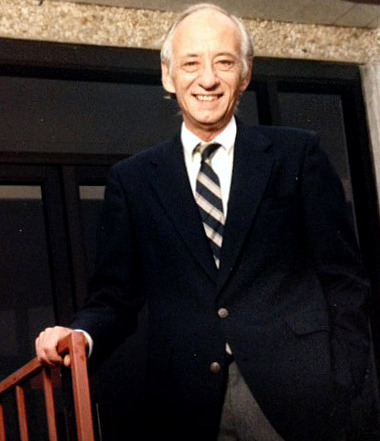
One of the behind-the-scenes luminaries of geosynthetics has passed. Dr. Joseph Scott Thornton, Jr. died peacefully at his home on 23 November 2014 in Austin, Texas at the age of 78. Scott, as he preferred simply to be known even in professional endeavors, is survived by sons Joseph Scott Thornton III, Christopher Pearson Thornton, and Chris’ wife Tiffany, as well as by two beloved grandchildren, Elizabeth and Jacob.
Scott graduated in 1968 from the University of Texas at Austin with a Doctorate in Mechanical Engineering. Soon after, he began a long career of developing unique engineering solutions and enhancements for the US Navy, other government agencies, and various private companies around the world. In 1975 he co-founded Texas Research Institute (TRI), which later became known as Texas Research International. He engendered this employee-owned company with a culture of scientific excellence, encouragement, and trust. The company flourished over the years, branching out into several stand-alone companies, including TRI Environmental—one of the world’s largest geosynthetics testing services providers—and Minerva TRI, publisher of Geosynthetica.net, Geosynthetica.net.br, and Geosindex.com.
Through the provision of technical, scientific, testing, materials engineering, and consulting expertise, TRI’s international footprint has extended into Asia, South America, and Australia. Scott Thornton has been TRI’s only president during this long period of growth.
Notably for the geosynthetics field, Scott pioneered the Stepped Isothermal Method (SIM), a predictive testing program that radically reduced the amount of time needed to conduct essential time-dependent creep and creep-rupture testing. A broad spectrum of geosynthetics and polymeric pipes were brought into the marketplace faster, creating a project and data record that have been essential to developing the strong trust in polymeric materials in modern construction and engineering.
Scott insisted that the SIM innovation would be freely shared and applied. Accordingly, it was standardized by ASTM International and the testing protocol is now used throughout several materials industries worldwide. At the 7th International Conference on Geosynthetics (7ICG) in Nice, France (2002), he received an IGS Award for his technical contribution and the generosity of his openness on SIM.
Beyond his geosynthetics work, Scott’s vision for dedicated materials science and problem-solving centered largely on reliability studies, failure analyses, and cost-benefit engineering. He developed and co-developed solutions for longer service lives for SONAR transducers, hydrophones, a non-conductive coating to prevent rubber-to-metal debonding from cathodic delamination, specialized adhesive and elastomer formulations, and nondestructive acoustic test monitoring systems for stress cracking.
Key to all these efforts was the continual development of efficient and robust testing and measurement systems. Scott delighted in applying existing materials theory to new and imaginative testing protocols to achieve a desired goal, and that approach was instrumental in the development of accelerated life testing (protocols) not just for geosynthetics but also deep seawater monitoring systems.
As he began to slowly step away from daily management obligations with TRI, Scott shifted his focus to the challenge of alcohol addiction which had impacted his life. He founded Volunteers at the Creek in January 2004.
This non-profit organization provided volunteer, peer-supported recovery programs and services for people suffering from alcoholism, substance use, and those who have both substance use and a co-occurring mental health condition (dual diagnosis). The organization’s motto, “Volunteers Give To Keep,” encompassed Scott’s vision. His creative energy and sprit of innovation continued through this new outlet with the use of patient “cross-talk” scripts, aggressive early use of recovering addict mentors, and measurement of treatment metrics to track and document “real” success. In 2008, the organization was renamed Communities for Recovery (CforR) and a community center was opened on the campus of Austin State Hospital (ASH).
Through his leadership and energy, the organization expanded its programming and services throughout the Austin area. Scott was deeply involved in developing curriculum, volunteering countless hours, working directly with those in recovery, and spearheading the accreditation by the Joint Commission. CforR received Joint Commission (TJC) Accreditation for Peer Recovery Support Programs in 2014, becoming the first Peer Recovery Community Organization in the United States to receive this accreditation.
Scott’s achievements were heralded on state and national levels. His contributions to the recovery community have impacted the lives of many.
He was a generous, witty, and dedicated individual who believed in nurturing others, celebrating their accomplishments, and making people feel part of a collective, accepting, and encouraging family.
Scott has left behind a growing and robust international company (TRI) and an award-winning, deeply dedicated service organization (CforR), but his greatest legacy is the generosity, dedication, and happiness that can be seen in his family, employees, colleagues, and friends. He will be greatly missed.
A memorial service is scheduled for Friday, December 12, 3:00 p.m. at 9225 Bee Cave Road, Building A, 3rd Floor with a reception to follow. All are welcome to attend and celebrate the life of Dr. Joseph Scott Thornton, Jr. In lieu of flowers, please send donations to Communities for Recovery (www.cforr.org), 4110 Guadalupe St, Bldg. 635 , Austin, Texas 78751. His family would like to thank everyone who called, visited and held him within their hearts.
**
Special thanks to the family of Scott, TRI Vice President Scott Strehli, and TRI Environmental Vice President Sam Allen for their contributions to this obituary.











